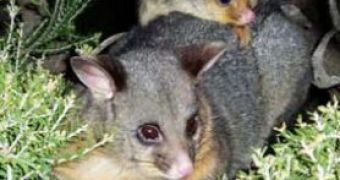Men are lurked over 40 by the intrusive to extremely dangerous prostate condition. The prostate gland begins to grow and - by the age of 60 - more than half of the men has prostate problems, including benign prostatic hyperplasia (BPH). "The prostate gland grew where it surrounded the urethra forcing the tissue to squeeze off, and sometimes completely block, the urethra", said Dr Bernie McLeod from AdResearch, New Zealand.
The main treatment for BPH is an invasive surgery, which can be very tricky. Even if techniques have improved, there is a chance to touch the nerves that make the penis functional, and a great part of those operated are left impotent.
And we talk about an advanced technique, without mentioning developing countries. But now, possums were found as possible owners of the clue for treating prostrate problems in men.
Researchers at AgResearch and the Otago Medical School, New Zealand, said the prostate gland in the bush-tailed possum (photo) is anatomically identical to that of humans.
The possum's prostate gland grew and shrank seasonally, linked to the mating period, and if the research could identify the trigger that caused that shrinkage, scientists could help develop a drug which would help men. Possum's prostates grew significantly during the breeding season and regressed after it. Many aspects of prostate growth in possums were proved to be very similar to BPH in men.
Those researching the human prostate were impeded by the lack of access to human prostate samples. "However, now they have access to tissues from the bush-tailed possum, they are endeavoring to find other, less invasive solutions," said McLeod.
Finding what causes the prostate to shrink in possums and then replicating the trigger in a drug for humans would let off patients of many painful and unwelcome secondary effects of a surgery.
Till now, the hormone mesotocin (equivalent to human oxytocin) has been linked with the possum's prostate growth. The research team has been investigating the matter for three years and over the next two years it would investigate the growth factors "implicated in prostate growth."
"This will involve determining the expression of various genes within possum prostate tissues at different times of the year, when the prostate is enlarging and when it is shrinking," said McLeod.

 14 DAY TRIAL //
14 DAY TRIAL //